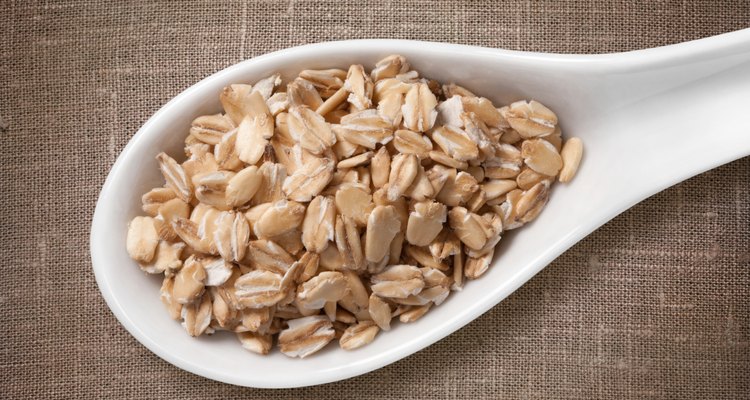
RomarioIen/iStock/Getty Images
Oats have more protein than any other grain and they supply lots of vitamins and minerals without excess salt or sugars. B vitamins are present in high concentrations in oats and, depending on processing, are available in oatmeal. But where oats really deliver is in the fiber content. The soluble and insoluble fiber in oatmeal is important for heart health and the digestive system.
Whole Grains
Whole oats have all three main parts of the grain. The outer layer, the bran, has most of the fiber, 50 to 80 percent of the minerals, phytochemicals and B vitamins. The endosperm is the largest part of the grain and contains fewer B vitamins, protein and the majority of the complex carbohydrates. The germ is power-packed with B vitamins, unsaturated fats, antioxidants, vitamin E, trace minerals and more phytochemicals. Most processed cereals include the endosperm but refined grains omit the bran and germ. A cereal may have all or part of the nutrients for each section of the grain and still be considered a whole grain, complete with healthy fiber.
Whole Grain Oat Cereal
Both rolled oats and instant oatmeal are made from whole oat kernels once the tough, inedible hulls have been removed. Rolled oats are lightly rolled and quick-cooking oatmeal is flattened. Instant oatmeal is made from the flattened processed oats, cut very small and further processed with several additives. The basic grain and its bran, endosperm and germ are present in both forms of cereal so they both contain fiber. The difference is in what kind and how much.
Process and Fiber
Quaker makes several varieties of oatmeal products using different preparation methods so the fiber content for its brand of rolled oats and instant oatmeal make them easy to compare. The amount of fiber in each of the varieties reflects its processing. Quaker Old Fashioned Oatmeal is rolled and slightly flattened. It contains 4 g of fiber per serving: 2 g of soluble fiber and 2 g of insoluble fiber for a total of 13 percent of a daily fiber requirement. Soluble fiber attracts water and slows digestion so you feel fuller longer. Insoluble fiber bulks the stool and keeps the digestive tract moving. Quaker Oats Original Instant has 3 g of dietary fiber per serving but only 1 g of that is soluble fiber. Instant oatmeal provides 11 percent of the daily fiber requirement per serving.
The Choice
Both rolled oats and instant oatmeal contain soluble fiber which lowers your cholesterol level and contributes to healthy digestion and better nutrition. Your choice may reflect taste preference or convenience but there are other considerations. Johns Hopkins School of Public Health recommends raw rolled oats for breakfast. Rolled oats not only provide more fiber than instant oatmeal, they are also cheaper, can be bought in bulk to save on packaging and have less sugar than more processed oat cereals.
Related Articles
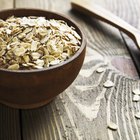
Proteins and Fiber in Oats
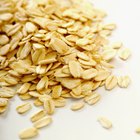
Can You Substitute Quick Cook Oats for ...

How to Cook Oat Groats in a Crock Pot
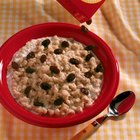
How Many Calories Do Oats Contain?
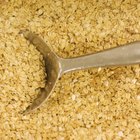
Differences Between Quaker Quick Oats & ...

Psyllium Husk & Gluten
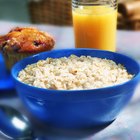
How to Cook Hot Cereal With Oat Bran in ...
Old Fashioned Oats in Place of ...
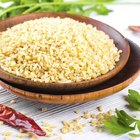
Bulgur Vs. Farro
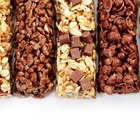
What Is the Difference Between Rolled ...
Substitutes for Oat Bran
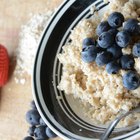
How to Prepare Quaker Oatmeal

Barley Malt Syrup vs. Brown Rice Syrup

How to Cook Oat Groats in a Slow Cooker

The Carbohydrates in Blueberries

Can I Substitute Rolled Oats for Flour ...

How to Make Quaker Oatmeal

Purpose of Rolled Oats in Baking

What Is White Oat?

Is Jasmine Rice Naturally White or Is ...
References
Writer Bio
Benna Crawford has been a journalist and New York-based writer since 1997. Her work has appeared in USA Today, the San Francisco Chronicle, The New York Times, and in professional journals and trade publications. Crawford has a degree in theater, is a certified Prana Yoga instructor, and writes about fitness, performing and decorative arts, culture, sports, business and education .
Photo Credits
RomarioIen/iStock/Getty Images